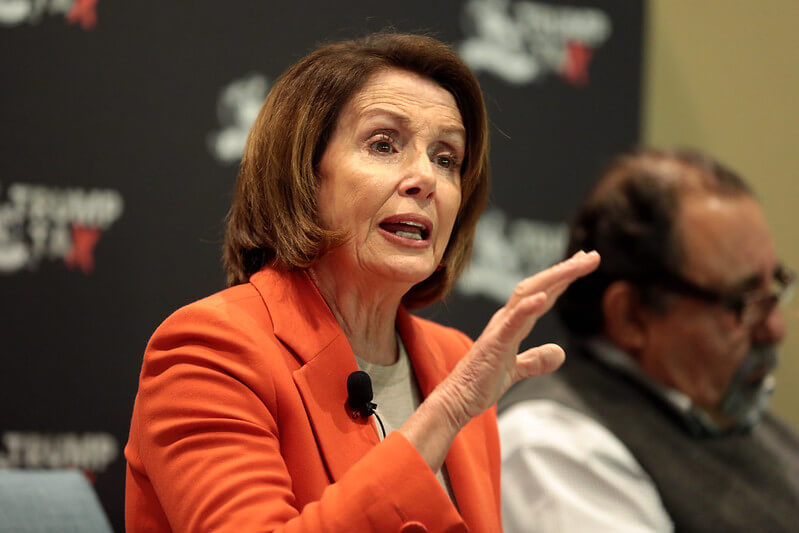
Speaker of the House Nancy Pelosi’s drug pricing bill, H.R.3, has passed three committees and is expected to come to the House floor for a vote before the end of the month.
The House Ways and Means Committee approved Pelosi’s bill late on Tuesday, before a “heated” debate broke out amongst key House Democrats, complaining that the bill “didn’t go far enough” to please progressives.
“There’s a strong consensus that we must take action, and there’s a robust debate about what kind of action will be most effective,” said Rep. Katie Porter of California, as she left the meeting. “That’s what this process should look like.”
Republicans also are unhappy with Pelosi’s legislation, despite proposing minimal changes when in committee. The minority party believes the bill will die in the Republican-controlled Senate.
“I don’t believe that I was elected to write bills that would never go anywhere,” said Michael Burgess of Texas, according to Politico, the top Republican on the Energy and Commerce Committee’s health panel. “And that’s exactly where this bill is headed.”
The bill is expected to pass the House, at which point it will move into the Senate. In all likelihood, it will face some barriers there, where Mitch McConnell has pledged to be the “grim reaper,” blocking Democrats’ policy proposals.
The Lower Drug Costs Now Act of 2019
Two new, nonpartisan analysis of H.R.3, done by the Congressional Budget Office [CBO] and the Centers for Medicare and Medicaid Services [CMS] Office of the Actuary, were released last week.
From the two pieces of analysis, the Act would achieve the following major goals:
- Reduce U.S. prices for negotiated drugs by 40-55% on average [CBO].
- Decrease deficits by $345 billion over the next seven years [CBO].
- Save patients an estimated $158 billion over the next seven years [Office of the Actuary].
The CMS analysis also projected the bill would significantly reduce health care costs in the U.S. on the whole, not just on drug costs. “The total U.S. spending on health care would decline by $480 billion under the bill,” their report states.
“The overall impact would be a significant savings as manufacturers reduced prices and paid for price inflation in excess of the CPI. While there would be savings overall for the Federal Government, Medicare beneficiaries, and the PHI market, Medicaid costs are projected to increase. The legislation would represent a dramatic and unprecedented shift in how the prescription drug market operates,” the CMS report states.
One of the concerns about the bill is that it could put a hinderance on new drugs coming to market, based on the potential for manufacturers to spend less on research and development with lesser profit margins.
“CBO also estimates that pharmaceutical manufacturers’ earnings would decline under title I, and manufacturers would reduce spending on research and development as a result. Although CBO has not completed its analysis of the bill’s implications for new-drug development, its preliminary estimate is that a reduction in revenues over the next 10 years of $0.5 trillion to $1 trillion would lead to a reduction of 8 to 15 new drugs coming to market,” CBO’s report reads. “It is difficult to know in advance the nature of these drugs or to quantify the effect of foregone innovation on health.”
A Hit To R&D Funds
This makes sense. Limiting profit margins will impact how much money is left over for research. But is this an industry worthy of us letting profit margins run wild, giving them the benefit of the doubt that they’ll do the right thing — develop new, lifesaving drugs — with those profits?
This is the same industry that lied to doctors and the public about the use and impact of opioids, paid off and bribed doctors to overprescribe them, created an opioid epidemic, and has been proven guilty for paying to delay generic drugs, as well as being proven guilty of price-fixing to increase profits.
It’s the same industry that has paid out millions and billions of dollars in settlements over the last few days because of that, and is still the center of several ongoing class-action lawsuits. The same industry that has ramped up the prices of age-old, life-saving drugs like insulin, leaving people risking their lives to ration a drug that was incredibly affordable 10 years ago.
Both Democrats and Republicans publicly claim lowering prescription drug costs is a top priority — if not the No. 1 priority. Pelosi’s bill will come to a House vote soon, but the road could end there. With both sides unwilling to yield to the other’s desires, this too could become an issue that gets solved at the voter box in 2020.
By Josh Cook
Posted 10/23/19
